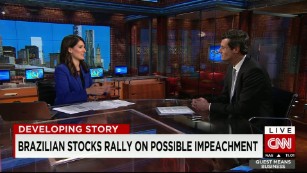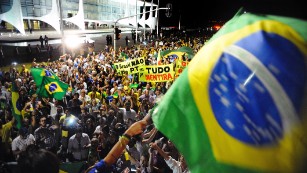Brazil: Supreme Court to rule on 'Lula' as President's impeachment risk grows
Brazil's political crisis is boiling over, and the impact could go well beyond the country's borders.
President Dilma Rousseff's odds of getting impeached are stronger than ever, now that the country's largest political party said it's pulling out of her coalition government.
And on Wednesday, the Supreme Court is expected to decide whether to approve Rousseff's appointment of controversial former President Luiz Inacio Lula da Silva to be her chief of staff. Regardless of which way the court rules, protests are likely to flare up.
All this comes as the world hones in on Brazil for its handling of the Zika virus and the upcoming Summer Olympics in Rio de Janeiro.
Here's the latest on the Brazil crisis and what it means:
Who are the players?
Brazilian Democratic Movement Party: The country's largest political party announced Tuesday that it's leaving the president's coalition government. That means Rousseff probably won't have enough votes in the national congress to avoid impeachment proceedings.
Why did the BDMP leave? The party is concentrating on "returning to its origins, finding its traditions and taking a position in favor of Brazil and the Brazilian people," said the group's second-in-command, Sen. Romero Juca.

Supporters rally for Brazilian president
President Dilma Rousseff: The president's second term has been marred by a corruption scandal that has spurred mass protests, but Rousseff has denied the allegations against her. Most recently, she's been criticized for appointing former President Luiz Inacio Lula da Silva to be her chief of staff.
Former President Luiz Inacio Lula da Silva: Critics say Rousseff's appointment of "Lula" to her Cabinet effectively shields him from a corruption investigation. The country's Supreme Court is set to decide Wednesday whether to approve Lula's assignment.

The economic impact of the Brazil protests
Speaker of the House Eduardo Cunha: He launched the effort to impeach Rousseff. But Cunha himself is under scrutiny by the Ethics Committee for allegedly failing to disclose the existence of offshore bank accounts to the Brazilian internal revenue service. If found guilty, he'll likely lose his post.
Vice President Michel Temer: He's the leader of the BDMP, the party that just left Rousseff's coalition government. It's unclear whether Temer will resign, but many on the Internet want him to. #RenunciaTemer (Temer Quit) became a trending topic online as the number of social media posts pushing the vice president to resign surged.
How did we get here?
The latest crisis began when federal police took Lula, the former president, in for questioning as part of a long-running corruption investigation.
A few days later, Rousseff -- his handpicked successor and protege -- named him chief of staff, a move that largely protects him from prosecution.

What Brazil's Lula da Silva appointment means to markets
That appointment prompted massive street protests. A legal battle has ensued trying to block Lula's appointment while efforts to impeach the president have gained momentum.
Even though Rousseff won a second term in 2014, she's battled controversy since.
A corruption investigation into a multimillion-dollar kickback scheme at the state-run oil company Petrobras has embroiled dozens of the country's leading businessmen and politicians.
Rousseff was the chairwoman of Petrobras during many of the years that the alleged corruption took place.
The President has denied the allegations.
What are the consequences?
The crisis could get a lot messier for both Brazil and the world.

Anti-corruption protests rock Brazil
If impeaching proceedings move forward, they would essentially freeze Rousseff's government for 180 days while the president fights the impeachment efforts. During that time, a caretaker government would step in -- possibly headed by the vice president, assuming he doesn't resign.
All this comes as Brazil grapples with its longest economic downturn since the 1930s.
Brazil is also ground zero for the Zika virus, which the World Health Organization says "is now spreading explosively."
Brazil alone has reported more than 4,000 cases of microcephaly -- a neurological disorder resulting in the births of babies with small heads -- in infants born to women infected with Zika while pregnant.
And in less than four months, Brazil will host the Summer Olympics. It's unclear what the government will look like when the world descends on Rio de Janeiro.
News Courtesy: www.cnn.com











